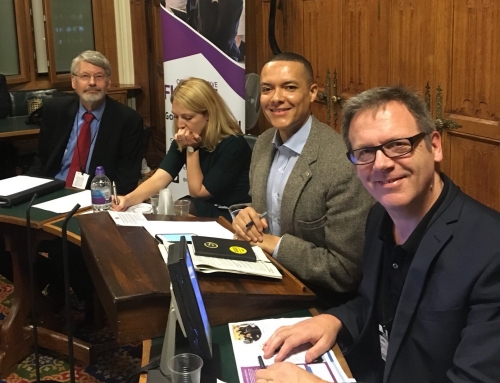Fiona Millar Patron of Comprehensive Future introduced the speakers. She described the comprehensive school as the most vibrant statement of the society in which we want to live. Selection by ability, aptitude and faith affects much of English secondary education. The possibility of all schools becoming foundation schools means that more and more schools will be able to choose their intakes. The Draft Code of Practice on School Admissions enshrines selection and in a complete reversal of the previous Code will allow parents of children who are put in for grammar school tests to know the results before making a preference. She urged everyone to respond to the consultation which ends on 18 October.
Angela Smith Parliamentary Under Secretary of State for Northern Ireland spoke of the situation in Northern Ireland, where the Government is seeking a common sense consensus. She wished to nail the myth that if you do not want selection that means you are against excellence or bright children doing well. All governments want to see every single child achieving their full potential. The Northern Ireland system, she said, has strengths in that there are higher levels of achievement at GCSE A to C and at A level but overall for all pupils achievement is lower than England. There are significant weaknesses which have to be addressed in order to avoid problems in the future. There are 320, 000 pupils in full time education, equivalent to an English county. There is a significant problem with falling rolls which will impact on secondary schools, primary schools are being closed now. Regarding the 11 plus or transfer test, this is only taken by two thirds of pupils and 41% of pupils go to grammar schools. This percentage is rising with an increasing impact on the non selective schools. In the Shankill only 7% of children get into the grammar schools, a message for those who see grammar schools as an engine for social mobility. The transfer test is being abolished and currently consultations are taking place on what replaces it. A pupil profile will be part of the process. There is more work needed to firm up the new system of admissions but she is confident that a new system will have the confidence of teachers and parents. It is a challenge which she is prepared to meet.
John Dunford General Secretary SHA reflectedon the way in which England, unlike Scotland and Wales, seems to cling on to divisions in education. There are more children in grammar schools in England now than in 1997. However he has reminded Conservative education spokespersons that no parent has ever voted to bring back selection. The specialist school policy, he said, had become a school improvement policy. Schools were improving because of funding, staff being energised and the networking between schools. On the issue of where we could have a progressive consensus he said it could be possible if we agreed certain principles –
- It is diversity within schools which is important, not between them.
- There has to be policy driven whole system improvement promoting collaboration and partnership
- Issues around admissions and exclusions have to be faced, with academies included
- Performance indicators should be based on groups of schools
- All schools were to become centres of high quality teaching and learning, rooted in communities, as community learning centres.
Gerry Bartlett Deputy General Secretary NASUWT saw no evidence of a progressive consensus in current Government policy. He used many examples in support of that –
- The obsession with choice, despite the evidence that what most parents want is a good neighbourhood school.
- Selection increasing as more schools become foundation schools and there are more academies
- The ability to select on aptitude when all children need to develop their skills in these curriculum areas
- The possibility that academies will exclude more pupils including those with special educational needs
In conclusion he said that the comprehensive ideal is supported by all progressives in education. What we are seeing now, he said is the deficit arising from diversity, threatening planning at local authority level.
Mary Bousted General Secretary of ATL commented that the Government seems to be obsessed by structures, the academy programme, whilst claiming it is standards not structures which are important. We need, she said, to look at what is a comprehensive curriculum. The curriculum of a comprehensive school should be able to meet the needs of every child, currently our children are taking many more tests that the rest of Europe. Schools need a balanced intake and a balanced curriculum.
Steve Sinnott General Secretary of the NUT said as well as a common sense consensus we need to look at the evidence. The PISA/OECD study showed that among industrialised countries comprehensive education was the most successful for all its children.
Points in the discussion –
- Calderdale is an example of a pecking order of schools with grammars and church schools. It is critical that there is a big response to the draft code consultation as if it goes ahead schools trying to take pupils of all ability will suffer. Southend is another example of the hierarchy where selection remains.
- The strong reaction to Government plans in NI has been largely from teachers in grammar schools
- Does a balanced intake need a balanced neighbourhood? Creaming and bussing out is important, but schools not in leafy suburbs can improve with good resources and strong leadership.
- NI is piloting specialist schools


